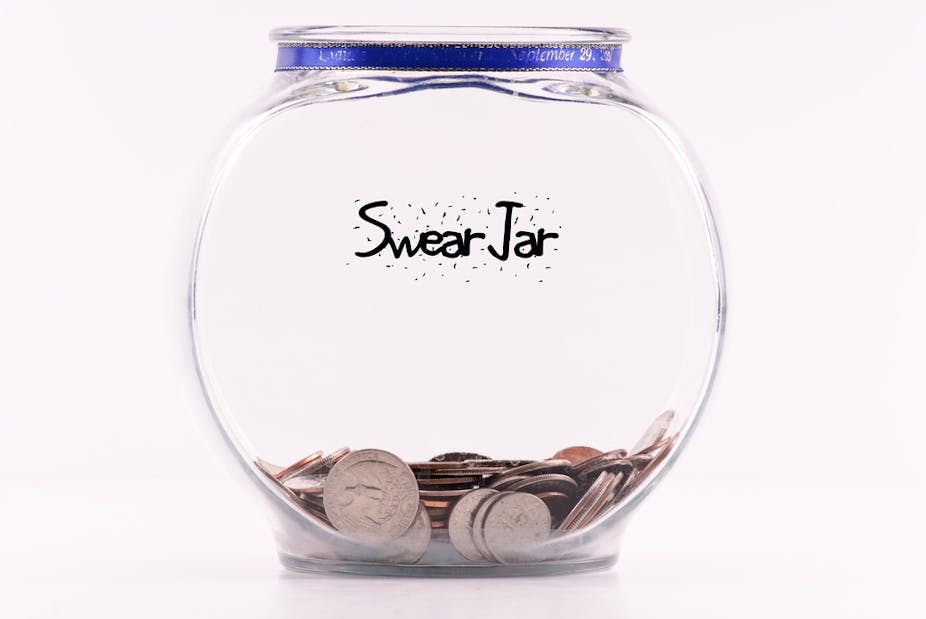A judge has been criticised for swearing at a defendant in court. When confronted with an offensive phrase from a repeat offender, Patricia Lynch QC retaliated in kind by saying he was “a bit of a cunt” himself. Her retort triggered a few blushes and resulted in around ten complaints. But why shouldn’t judges, politicians and other public figures swear? We all do it, so why not them?
To answer this question, we need to distinguish between different kinds of swearing. If you shout some expletive in response to slamming your finger in a door, you might offend someone who happens to overhear you, but that is an indirect, unintentional, outcome. This kind of swearing, in response to pain, grief, astonishment or other triggers, is very common. Since it is a reflex action, the obscenity is frequently out of our mouths before we have had a chance to determine whether it is contextually appropriate.
Research has shown that swearing in such situations has hypoalgesic benefits – increasing pain tolerance and decreasing pain perception. Replacement of the swear word with a less offensive alternative – “shoot” or “sugar” for “shit” – lessens the cathartic effect. If the judge’s swearing had been prompted by having trapped her finger in the courtroom door, it may have caused a snigger or two, but would have hardly been grounds for an enquiry.
Social swearing
As well as helping us deal with unpleasant physical and emotional sensations, swearing plays an important role in aiding social cohesion. Along with other kinds of slang usage, swearing serves to promote group identity and helps to define youth culture in opposition to the polite world of adult speech.
In such contexts, it is common to hear offensive language being used as part of what linguists term “positive politeness strategies” – intended to promote friendliness, camaraderie and solidarity. As such, offensive terms like “bugger”, “bastard”, “fucker” and even – in parts of the UK, Ireland and Australia – “cunt”, function as terms of endearment.
But in formal environments, such as the law courts or the Houses of Parliament, it is expected that speakers will instead employ negative politeness strategies – using polite forms of address and terms of respect to emphasise social distance, deference and independence. Parliamentary discourse is regulated by the speaker, who has the right to request that an MP considered to have used unparliamentary language withdraws it.
But exactly which words are likely to incur the speaker’s wagging finger is unclear; in the past, these have included “blackguard”, “coward”, “git”, “guttersnipe”, “rat” and “swine”. In March 2016, Michael Fabricant apologised for using an “eight-letter word beginning with b and ending with cks” during a debate over the EU. He was upbraided by the speaker for the “unseemly utterance”, but, since it was spoken spontaneously and from a sedentary position, no further action was deemed necessary.
Turning the air blue
Similar problems bedevil the policing of the language of the broadcast media. Research by Ofcom into attitudes towards swearing on television found that respondents were willing to tolerate bad language where it was felt to be contextually justified, according to factors such as the timing of the broadcast, likely and potential audiences, frequency of offensive language, and the tone and intention of the programme.

In determining the acceptability of bad language, therefore, programme makers are expected to balance potential audience responses alongside artistic integrity. But, since what constitutes bad language is conditioned by a range of factors, such as age, gender, social background and geography, this is something of a moving target. What prompts a letter to a newspaper from Disgusted of Tunbridge Wells may also be greeted with a “😂” by a viewer live-tweeting a show.
It may be hard to imagine a time when the word “cunt” wasn’t offensive, but in the Middle Ages it was found in street names – such as Gropecunte Lane in Oxford (now modified to the more respectable Magpie Lane) – and personal names – such as Godewin Clawecunte and Simon Sitbithecunte. The word was acceptable in medical usage and is even found in literary writing, including the works of the poet Geoffrey Chaucer, where it appeared as “queynte”.
The age of prudery
But in the 18th century, a period of linguistic prudery in which concepts of decorum and refinement were established, it was seen as crude and unacceptable in polite discourse. It was omitted from Dr Johnson’s Dictionary of the English Language (1755) and in Francis Grose’s Classical Dictionary of the Vulgar Tongue (1785) it appeared as a rather coy four asterisks, and was defined as “a nasty word for a nasty thing”. It did not appear in another English dictionary until the 1960s.
While there may be a grey area around exactly which words are unacceptable in a court of law, the Houses of Parliament and the media, most people would agree that that the word “cunt” remains strongly taboo. Many of the newspapers reporting the judge’s use of the word chose not to print it in full, preferring the sanitised form “c–t”. Other euphemistic alternatives it is has spawned over the years include the “c-word”, “berk” (from Cockney Rhyming Slang “Berkeley hunt”), “cunny”, and even “quaint”.
The judge subsequently apologised for her language – and has been cleared of judicial misconduct. Despite this, her response was widely celebrated on social media, with many people branding her a hero. This reaction was presumably prompted by the sense that in this case the defendant had been found guilty of racially abusing strangers and it was therefore a perfectly just riposte.

